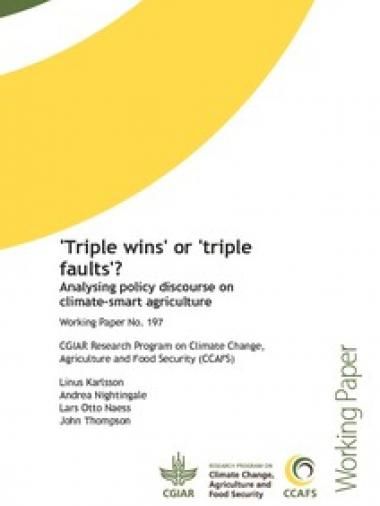'Triple wins' or 'triple faults'? Analysing policy discourse on climate-smart agriculture (CSA)

This paper aims to unpack the equity implications of ‘climate-smart agriculture’ (CSA). The
CSA approach has gained considerable traction in recent years, but remains highly contested.
One of the principal areas of contestation relates to CSA’s contribution to social equity, yet
equity is rarely defined in the CSA literature. To fill this gap, we apply an equity framework
to four discourses that are commonly encountered in debates on the challenges and
opportunities for applying CSA in different contexts and for different purposes. From this, we
identify three important equity issues: First, distributive equity implies a need to acknowledge
how CSA may transfer the burden of responsibility for climate change mitigation to
marginalized producers and resource managers. Second, a procedural equity perspective
reveals how CSA discourses generally fail to confront entrenched power relations that may
constrain or block the emergence of more ‘pro-poor’ forms of agricultural development,
adaptation to climate change, or carbon sequestration and storage. Third, to improve CSA
outcomes, a focus on contextual equity means the need to pay more attention to the
institutions that underpin the bargaining power of the poorest and most vulnerable groups, as
well as a deeper acknowledgement of the political nature of transformations that are needed to
address challenges around the agricultural sector in a changing climate.
Citación
Karlsson L, Nightingale A, Naess LO, Thompson J. 2017. ‘Triple wins’ or ‘triple faults’? Analysing policy discourses on climate-smart agriculture (CSA). CCAFS Working Paper no.197. Copenhagen, Denmark: CGIAR Research Program on Climate Change, Agriculture and Food Security (CCAFS).